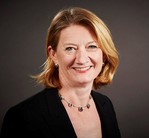
Vanessa Sharp
Non-Executive Director at Newable Ltd, ICE Futures Europe, Hill Robinson Yaught Management, Companies’ House, British Hallmarking Council, Goldsmiths College, London University and Trustee at Create Arts.
You can listen to Vanessa’s story in full on podcast here or search ‘Women on Boards Success Stories’ in all major apps:
Climbing the boardroom ladder step by step
As with most things, our careers often look clearer in hindsight. So when asked if accepting a trustee role at a community gallery was a strategic move to begin her NED career, Vanessa considers, ‘At the time? Maybe. But looking back now, it was definitely the first piece of the puzzle.’
She was still working as General Council at KPMG when she took on the role with Arts Sway – a local gallery where she had been exhibiting her side-line jewellery business. The board at the time was mainly composed of artists so they wanted someone who also had commercial expertise. And here is one of her first lessons when applying for board roles no matter how competitive: “Don’t think ‘I’m General Counsel at KPMG so of course they should give me the role.’ You need to frame it as ‘in my role I’ve learnt all these things, which will be useful to this board.’”
It was this approach that helped her go on to secure a non-executive role at Goldsmith College, London University. This was a ‘really big step’ for her into this far larger, more complex organisation. However, she used her experience with Art Sway’s education work to satisfy their requirement for an educational background, combined with bringing the commercial acumen and business connections they wanted from her work at KPMG. Goldsmith’s offered the opportunity to apply her financial risk and change management skills in a non-executive role – crucial experience which has helped her subsequent appointments.
A ‘values based’ portfolio
Vanessa’s plan in building her non-executive portfolio from this solid foundation was more values-based than sector specific. She sought out roles that inspired her, opportunities to work with interesting people and stretch her personal development, as well as creating some public benefit. For example, the opportunity to revive the ‘Authorisation and Rules of Conduct’ committee at ICE Futures Europe was a significant but exciting challenge. In fact, she is involved in committee work with all her roles which she finds fundamental as ‘it allows you to learn so much more about the organisation’.
This approach has led to an hugely diverse range of NED roles, but she is quick to point out the strong thread in requiring risk and governance expertise. There are also complimentary overlaps, such as Companies House which registers small businesses and Newable Ltd which supports them.
Vanessa is clear that not every role will be a fit. She has investigated a few roles but pulled out at an early stage as they didn’t feel right. ‘It’s quite difficult to put your finger on why,” she explains. ‘You have to feel you trust the organisation, as your personal reputation is on the line as well.”
Dealing with rejection
She is also adamant a level of rejection is inevitable. Although she has heard about most roles through her network, she has never simply been invited on to a board. There is always a competitive process in today’s marketplace. At the start she believes she lost out on roles as she puts it frankly, ‘my applications weren’t good enough’. She hadn’t applied for a job during her 19 years at KPMG so there was a learning process in applying for roles. She found public sector applications ‘a bit of an art’ to fit with what is quite a formal process. However, she considers your reaction to rejection is key to your long-term success. “I’ve been upset every time [I’ve been rejected] but there will be more! You’ve just got to take a deep breath and think ‘what can I learn from this?’”
Vanessa’s experience shows building a boardroom career takes resilience and a passion for the work. The difference between paid and unpaid roles is ‘very little – unfortunately for those in the pro bono roles’ she explains. In fact, her university role is entirely unpaid but one of the most demanding in complexity and time. Yet she had taken on extra responsibilities – including recently being on the selection panel for a new warden (vice chancellor) – and is sad to be leaving at the end of her 6 year term. The rewards of non-executive work are clearly far more than financial.
